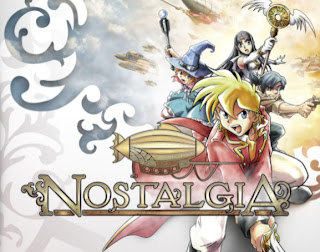The following is a guest review written by George Morin. You can find more of his work at Games On The Platform.
The term RPG has been thrown around loosely in recent times.
More often than not, games use the term “RPG elements” to attach numbers to
characters, equipment, and items. In the early days of RPGs the story was
always the highlight of the genre with other elements complimenting it. The
emotional attachment to guide each character through the game’s hardships and
not letting them down. This is where Radiant
Historia shines.
Radiant Historia
is a Japanese RPG for the Nintendo DS that was released in early 2011 in North
America. The art is a grittier and modern style which is lesser known for
JRPGs. The adjustment may take some time, but it truly fits the world and story
the game conveys. In this world there are two warring kingdoms, Alistel and
Granorg. This war has developed due to the desertification of the world, which
sucks the life out of all living things it touches. You are Stocke, an
intelligence agent of the Alistel kingdom. As your story begins, Stocke
receives a fatal mission that he barely escapes from and arrives in Historia, a
timeless area containing the power of time travel. Stocke is the only one able
to stop the desertification of the world through time travel and careful
judgment.
Although a cliché opening to the story, it serves two
important plot devices. First it is generic enough to allow anyone to
understand the world's situation and why our protagonist needs to succeed until
the end. A story is only as engaging as the player's attention span. If the
story is too complex, confusing, or uses too much jargon, it won't engage the
player to the fullest. The other important plot device this gives the player is
time travel. The player has now gauged the strength of their character and has
seen his weakness. Instead of plowing through enemies senselessly, an
attachment to the characters grows as the characters do.
Time travel can be a double edged sword. When done right, it
gives the story flavor that otherwise wouldn't be possible. A decision right
after receiving the power to time travel is to continue under the intelligence agent,
or to join a friend’s unit within the military. This will create a two
completely different time lines that the player must experience to reach the
end. Holding two very different timelines with the same characters adds depth
to every character in drastic ways. Completionists are able to experience every
item, skill, party member, etc. the game has to offer.
The combat of the game is in many ways challenging and easy.
It is turn based which is typical of RPGs, but it has a twist. Enemies can
exist in a 3x3 grid, while your party plays in a similar fashion to turn based
JRPGs. The interesting aspects of combat come from the positioning of the
enemies. While you have multiple turns of your party in a row, enemies can be
stacked and treated like they are attacked separately. Each character has
various skills to move the enemies around their 3x3 field, giving usefulness to
different characters for certain strategies.
The difficulty may be one of my only complaints in this
game. Throughout the story leveling your characters is not much of an issue. It
is possible to use characters 10-20 levels below without much of a noticeable
handicap. Towards the end of the game this changes in a horrendously terrible
way. Battles are long and drawn out, and bosses have the ability to One Hit
Knock Out (OHKO) party members. The game didn’t lead up to the last 3-4 boss
battles in any tangible way. This would be the only time when the player needs
to learn how to effectively dispatch the enemies in order or in a timely manner.
This would also be the only time when the player may need to spend some time
grinding levels to live through some of the boss battles.
Overall, Radiant
Historia was a brilliantly crafted game. Especially in more recent times,
storytelling has taken a backseat to graphics, gameplay, cinematics, and end
game content. Rather than forcing yourself to complete the game to enjoy any of
these important but empty traits, Radiant
Historia pulls you into its story like a good book. In many ways it won’t be
used to kill time, rather you will kill time to play it.
If you liked this review, please check out my blog at Games On The Platform.
-George Morin
Title: Radiant Historia
Developer: Atlus
Genre: Japanese Role-Playing Game
Year: Nov 2010 (JP) Feb 2011 (NA)
Platform: Nintendo DS
Completion: Going the completionist route of all story
nodes, side quests, skills, and hidden items, it took me roughly 42 hours. I
picked up on the combat system quite early but it’s easily a 30-35 hour main
story.






















